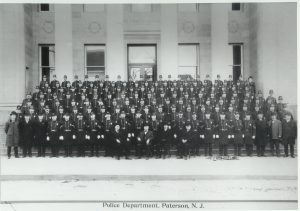Effect of Criminal Charges on New Jersey Public Employment
Under New Jersey employment law, criminal charges can have a significant impact on government employment beyond the penalties carried by the criminal charges themselves.  These effects impact both civil service and non-civil service employees.
These effects impact both civil service and non-civil service employees.
Suspensions While Criminal Charges Are Pending
First, a public employee may be suspended while criminal charges are pending.
If the employee is employed by a civil service jurisdiction, then the full procedural protections of New Jersey civil service law apply. Thus, a civil service employee who is suspended because of pending criminal charges must be served with a preliminary notice of disciplinary charges (a “PNDA” or a Form 31-A). The PNDA must advise the employee that the Forfeiture Statute may apply, and that the employee has the right to an attorney. The employee may request a departmental hearing about the suspension within five days after receiving the PNDA.
The hearing is limited to:
the issue of whether the public interest would best be served by suspending the employee until disposition of the criminal complaint or indictment. The standard for determining that issue shall be whether the employee is unfit for duty or is a hazard to any person if permitted to remain on the job, or that an immediate suspension is necessary to maintain safety, health, order, or effective direction of public services.
If no request for a hearing is made the employer may issue a final notice of disciplinary action (a “FNDA” or a Form 31-B). The regulations provide that if the crime charged is of the “first, second or third degree, or a crime of the fourth degree on the job or directly related to the job”, the suspension may be indefinite, but not beyond the disposition of the criminal complaint or indictment. If the employee enters Pre-Trial Intervention (“PTI”) or receives a conditional discharge, the criminal complaint or indictment will not be deemed disposed of until completion of PTI or final dismissal of the previously conditionally dismissed charges. During such time, the employer has the option of continuing the indefinite suspension. If an employer decides to suspend the employee indefinitely, it must issue a FNDA stating that the employee has been indefinitely suspended pending disposition of the criminal complaint or indictment. When a police officer was suspended for criminal charges, and the eventual outcome was pre-trial intervention, relief such as back pay, benefits, counsel fees, etc., will not be awarded.
Forfeiture of Public Employment by Court Order
The New Jersey Criminal Code requires that an employee forfeit her office, position or employment, and the court order such forfeiture, if:
(1)He is convicted under [New Jersey law] of an offense involving dishonesty or of a crime of the third degree or above or under the laws of another state or of the United States of an offense or a crime which, if committed in this State, would be such an offense or crime;
(2)He is convicted of an offense involving or touching such office, position or employment; or
(3)The [New Jersey] Constitution so provides.
In other words, if one of these convictions applies, the Court will order that the employee be terminated from public employment. This provision is known as the “Forfeiture Statute.”
Disciplinary Action Where No Forfeiture Order
If the criminal action does not result in a forfeiture order, an employer may still proceed with discipline because the acts which were found not to be criminal may still be grounds for discipline, or because even though they could not be proven beyond a reasonable doubt in a criminal court, they could still be proven under the lower burden of proof required for disciplinary proceedings. In that case, a New Jersey civil service employer is required to issue a second PNDA specifying any disciplinary charges which remain against the employee upon final disposition of the charges, and proceed with appropriate civil service discipline procedures. This action may be appealed through the procedures for appeals to the New Jersey Civil Service Commission.
When an employee has pled guilty or been convicted of a forfeiture level crime but the court has not entered a forfeiture order, the employer may seek forfeiture by applying to the court for an order of forfeiture. Departmental hearings are not required. If the court still declines to enter an order of forfeiture, the employer may pursue other disciplinary charges, if any.
Relief After Suspensions Pending Criminal Charges
Civil service regulations provide that “Where an employee, other than a municipal police officer, has been suspended based on a pending criminal complaint or indictment, following disposition of the charges the employee shall receive back pay, benefits and seniority if the employee is found not guilty at trial, the complaint or indictment is dismissed, or the prosecution is terminated.” In other words, the employee must be exonerated; pre-trial intervention (PTI) and conditional discharge do not constitute exoneration. Separate rules provide for relief for exonerated police officers, be they in civil service or non-civil service jurisdictions.
Contact Us
Our New Jersey employment attorneys represent New Jersey government employees in both civil service and non-civil service jurisdictions in all aspects of New Jersey employment law. Call us at (973) 890-0004 or fill out the contact form on this page to schedule a consultation with one of our New Jersey employment lawyers. We can help.
 New Jersey Lawyers Blog
New Jersey Lawyers Blog

